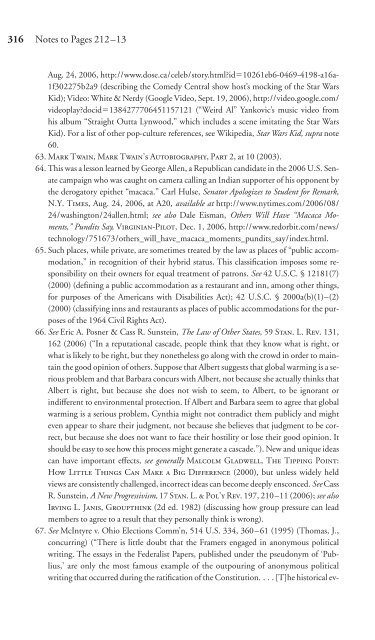Download - Future of the Internet â And how to stop it.
Download - Future of the Internet â And how to stop it.
Download - Future of the Internet â And how to stop it.
Create successful ePaper yourself
Turn your PDF publications into a flip-book with our unique Google optimized e-Paper software.
316<br />
Notes <strong>to</strong> Pages 212–13<br />
Aug. 24, 2006, http://www.dose.ca/celeb/s<strong>to</strong>ry.htmlid10261eb6-0469-4198-a16a-<br />
1f302275b2a9 (describing <strong>the</strong> Comedy Central s<strong>how</strong> host’s mocking <strong>of</strong> <strong>the</strong> Star Wars<br />
Kid); Video: Wh<strong>it</strong>e & Nerdy (Google Video, Sept. 19, 2006), http://video.google.com/<br />
videoplaydocid1384277706451157121 (“Weird Al” Yankovic’s music video from<br />
his album “Straight Outta Lynwood,” which includes a scene im<strong>it</strong>ating <strong>the</strong> Star Wars<br />
Kid). For a list <strong>of</strong> o<strong>the</strong>r pop-culture references, see Wikipedia, Star Wars Kid, supra note<br />
60.<br />
63. MARK TWAIN, MARK TWAIN’S AUTOBIOGRAPHY, PART 2, at 10 (2003).<br />
64. This was a lesson learned by George Allen, a Republican candidate in <strong>the</strong> 2006 U.S. Senate<br />
campaign who was caught on camera calling an Indian supporter <strong>of</strong> his opponent by<br />
<strong>the</strong> deroga<strong>to</strong>ry epi<strong>the</strong>t “macaca.” Carl Hulse, Sena<strong>to</strong>r Apologizes <strong>to</strong> Student for Remark,<br />
N.Y. TIMES, Aug. 24, 2006, at A20, available at http://www.nytimes.com/2006/08/<br />
24/washing<strong>to</strong>n/24allen.html; see also Dale Eisman, O<strong>the</strong>rs Will Have “Macaca Moments,”<br />
Pund<strong>it</strong>s Say, VIRGINIAN-PILOT, Dec. 1, 2006, http://www.redorb<strong>it</strong>.com/news/<br />
technology/751673/o<strong>the</strong>rs_will_have_macaca_moments_pund<strong>it</strong>s_say/index.html.<br />
65. Such places, while private, are sometimes treated by <strong>the</strong> law as places <strong>of</strong> “public accommodation,”<br />
in recogn<strong>it</strong>ion <strong>of</strong> <strong>the</strong>ir hybrid status. This classification imposes some responsibil<strong>it</strong>y<br />
on <strong>the</strong>ir owners for equal treatment <strong>of</strong> patrons. See 42 U.S.C. § 12181(7)<br />
(2000) (defining a public accommodation as a restaurant and inn, among o<strong>the</strong>r things,<br />
for purposes <strong>of</strong> <strong>the</strong> Americans w<strong>it</strong>h Disabil<strong>it</strong>ies Act); 42 U.S.C. § 2000a(b)(1)–(2)<br />
(2000) (classifying inns and restaurants as places <strong>of</strong> public accommodations for <strong>the</strong> purposes<br />
<strong>of</strong> <strong>the</strong> 1964 Civil Rights Act).<br />
66. See Eric A. Posner & Cass R. Sunstein, The Law <strong>of</strong> O<strong>the</strong>r States, 59 STAN. L. REV. 131,<br />
162 (2006) (“In a reputational cascade, people think that <strong>the</strong>y know what is right, or<br />
what is likely <strong>to</strong> be right, but <strong>the</strong>y none<strong>the</strong>less go along w<strong>it</strong>h <strong>the</strong> crowd in order <strong>to</strong> maintain<br />
<strong>the</strong> good opinion <strong>of</strong> o<strong>the</strong>rs. Suppose that Albert suggests that global warming is a serious<br />
problem and that Barbara concurs w<strong>it</strong>h Albert, not because she actually thinks that<br />
Albert is right, but because she does not wish <strong>to</strong> seem, <strong>to</strong> Albert, <strong>to</strong> be ignorant or<br />
indifferent <strong>to</strong> environmental protection. If Albert and Barbara seem <strong>to</strong> agree that global<br />
warming is a serious problem, Cynthia might not contradict <strong>the</strong>m publicly and might<br />
even appear <strong>to</strong> share <strong>the</strong>ir judgment, not because she believes that judgment <strong>to</strong> be correct,<br />
but because she does not want <strong>to</strong> face <strong>the</strong>ir hostil<strong>it</strong>y or lose <strong>the</strong>ir good opinion. It<br />
should be easy <strong>to</strong> see <strong>how</strong> this process might generate a cascade.”). New and unique ideas<br />
can have important effects, see generally MALCOLM GLADWELL, THE TIPPING POINT:<br />
HOW LITTLE THINGS CAN MAKE A BIG DIFFERENCE (2000), but unless widely held<br />
views are consistently challenged, incorrect ideas can become deeply ensconced. See Cass<br />
R. Sunstein, A New Progressivism, 17 STAN. L. & POL’Y REV. 197, 210–11 (2006); see also<br />
IRVING L. JANIS, GROUPTHINK (2d ed. 1982) (discussing <strong>how</strong> group pressure can lead<br />
members <strong>to</strong> agree <strong>to</strong> a result that <strong>the</strong>y personally think is wrong).<br />
67. See McIntyre v. Ohio Elections Comm’n, 514 U.S. 334, 360–61 (1995) (Thomas, J.,<br />
concurring) (“There is l<strong>it</strong>tle doubt that <strong>the</strong> Framers engaged in anonymous pol<strong>it</strong>ical<br />
wr<strong>it</strong>ing. The essays in <strong>the</strong> Federalist Papers, published under <strong>the</strong> pseudonym <strong>of</strong> ‘Publius,’<br />
are only <strong>the</strong> most famous example <strong>of</strong> <strong>the</strong> outpouring <strong>of</strong> anonymous pol<strong>it</strong>ical<br />
wr<strong>it</strong>ing that occurred during <strong>the</strong> ratification <strong>of</strong> <strong>the</strong> Const<strong>it</strong>ution. ... [T]he his<strong>to</strong>rical ev-


